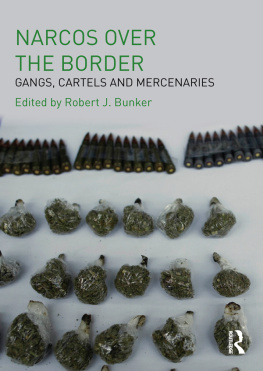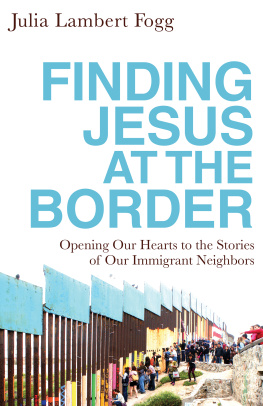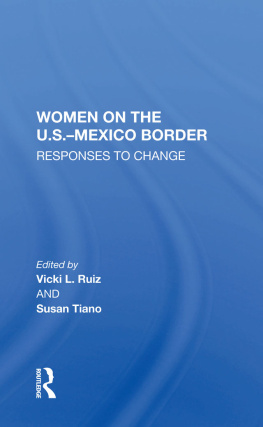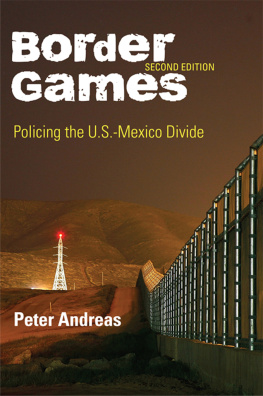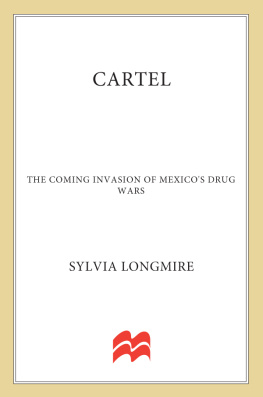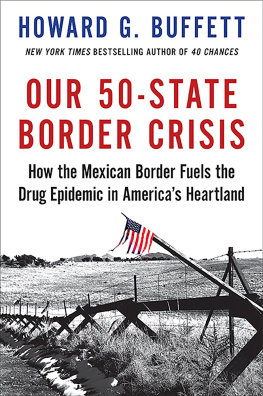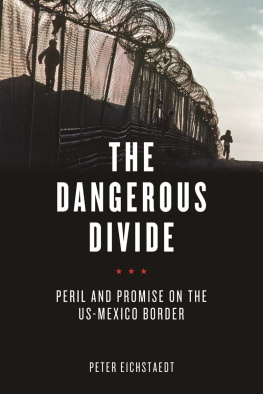Love in the Drug War
Selling Sex and Finding Jesus on the Mexico-US Border
SARAH LUNA

University of Texas Press
Austin
, Rumors of Violence and Feelings of Vulnerability, was originally published as Affective Atmospheres of Terror on the Mexico-U.S. Border: Rumors of Violence in Reynosas Prostitution Zone and is reproduced by permission of the American Anthropological Association from Cultural Anthropology, Volume 33, Issue 1, pp. 5884, 2018. Not for sale or further reproduction.
Copyright 2020 by the University of Texas Press
All rights reserved
First edition, 2020
Requests for permission to reproduce material from this work should be sent to:
Permissions
University of Texas Press
P.O. Box 7819
Austin, TX 78713-7819
utpress.utexas.edu/rp-form
Library of Congress Cataloging-in-Publication Data
Names: Luna, Sarah, author.
Title: Love in the drug war : selling sex and finding Jesus on the Mexico-US border / Sarah Luna.
Description: First edition. | Austin : University of Texas Press, 2020. | Includes bibliographical references and index.
Identifiers: LCCN 2019021669
ISBN 978-1-4773-2049-5 (cloth)
ISBN 978-1-4773-2050-1 (paperback)
ISBN 978-1-4773-2051-8 (library e-book)
ISBN 978-1-4773-2052-5 (non-library e-book)
Subjects: LCSH: ProstitutionMexicoReynosa (Tamaulipas) | Church work with prostitutesMexicoReynosa (Tamaulipas) | Sex-oriented businessesMexicoReynosa (Tamaulipas) | Religion and cultureMexicoReynosa (Tamaulipas) | Drug trafficSocial aspectsMexicoReynosa (Tamaulipas) | Reynosa (Tamaulipas, Mexico)Social conditions.
Classification: LCC HQ151.R48 L85 2020 | DDC 306.740972/12dc23
LC record available at https://lccn.loc.gov/2019021669
doi:10.7560/320495
Contents
Acknowledgments
Research and writing were supported by the National Science Foundation Graduate Research Fellowship; the Fulbright-Hays Doctoral Dissertation Abroad Fellowship; the University of Chicago Trustees Fellowship; the University of Chicago Center for Latin American Studies Field Research Grant; the University of Chicago Lesbian and Gay Studies Project Graduate Research Grant; the Northeast Consortium Dissertation Year Visiting Diversity Fellowship in the Department of Anthropology at the University of Rochester; the James C. Hormel Dissertation Fellowship in Sexuality Studies at the University of Chicago; the Center for US-Mexican Studies Predoctoral Fellowship at the School of International Relations and Pacific Studies at the University of California, San Diego; a National Endowment for the Humanities seminar entitled The Cross-Border Connection: Immigrants, Emigrants, and their Homelands; the Womens, Gender and Sexuality Studies Program and the Friends of Womens Studies at the University of Houston; the Consortium for Faculty Diversity Fellowship in the Latin American Studies Program at Davidson College; the Five College Womens Studies Resarch Center Writing Retreat; and a Faculty Research Award at Tufts University.
I will not name any of you in order to protect your safety and privacy, but my deepest gratitude goes to the people in Reynosa who shared their lives with me. Muchas gracias a toda la gente en Reynosa que particip en mi proyecto: mi familia reynosense y mi mejor amigo, un extraterrestre como yo. Gracias tambin a los archivistas, historiadores, y todos los que me ayudaran a hacer esta investigacin. A las mujeres que conoc en la zona: muchsimas gracias por haber compartido parte de sus historias y parte de sus vidas conmigo. Ustedes son gran mujeres, de quien he aprendido mucho. En los momentos cuando me cost trabajo escribir, pensaba en la fuerza y la tenacidad de ustedes. I would also like to thank the missionaries, without whom I would have had much difficulty conducting my research in la zona. You have been nothing but kind and generous to me, and I am grateful not only for your help with this project but also for your friendships.
This book grew from a doctoral dissertation at the University of Chicago, where I was fortunate to have the intellectual engagement and fierce mentorship of Susan Gal, Julie Chu, Melissa W. Wright, Kesha Fikes, and Danilyn Rutherford. This work also benefited from engagement with John Kelly, Judy Farquar, Nancy Munn, Anne Chien, Carly Schuster, Laura-Zo Humphreys, Abigail Rosenthal, Rocio Magaa, Jessica Cattelino, Molly Cunningham, Lisa Simeone, John Davey, George Paul Meiu, Mike Cepek, Gustavo Rivera, Jonathan Rosa, Mara Fortes, Sarah Tuohey, Gina Olson, Samantha Twigg Johnson, LaShandra Sullivan, Elayne Oliphant, Elise Kramer, J Baker, Jay Sosa, Malic White, Tal Liron, Bea Jauregui, Abigail Rosenthal, Lauren Berlant, Linda Zerilli, Kristen Schilt, Jennifer Cole, Monica Mercado, Larisa Reznik, Julia Kowalski, Tracey Rosen, and Michelle Lelivre. Thank you especially to Hadas Weiss, whose feedback substantially helped the book during the last push.
When I was an undergraduate at the University of Texas at San Antonio, my professors there both inspired me to pursue graduate study in anthropology and provided me excellent mentorship through the process. Thank you especially to Ann Eisenberg, Laura Levi, James McDonald, Kolleen Guy, Kirsten Gardner, and Christine Caver.
Through predoctoral and postdoctoral fellowships as well as short teaching stints, I was fortunate for the mentorship, support, intellectual engagement, and friendship of a number of people. The faculty at the University of Rochester provided me with an excellent environment to write part of the dissertation that would become this book. Thank you to Robert Foster, Eleana Kim, John Osburg, Daniel Reichman Ayala Emmett, Thomas P. Gibson, Anthony T. Carter, and Rose Marie Ferreri. At the University of California, San Diego, my work was influenced by conversations and engagement with Alberto Diaz-Cayeros, Joseph Hankins, Maurice Magaa, Michael Lettieri, Danny Zborover, Kathy Kopinak, Suzanne Brenner, John Haviland, Karina Kordova, Jillian Hernandez, Nancy Postero, Veronica Pacheco, Rupert Stasch, and Greg Mallinger. At the University of Houston, I want to thank Elizabeth Gregory, Keith McNeal, Guillermo de los Reyes, Dina Alsowayel, Maria Gonzales, Trevor Boffone, Rachel Afi Quinn, Laura McGuire, Keith McNeal, Christina Sisk, Leandra Zarnow, Caryn Tamber-Rosenau, Natalie Harren, Beverly McPhail, Sylvia Mendoza, Ayanna Jolivet McCloud, and Kavita Singh. At Davidson College, I want to thank Melissa Gonzales, Matt Sampson, Devyn Spence Benson, Jane Mangan, Wendy Raymond, Katie Horowitz, Patrick Barron, Alison Bory, Sarah Waheed, Roman Utkin, Laura Sockol, and Patricio Boyer.
Thank you to my colleagues at Tufts University for providing an engaging and supportive environment in which to finish the book. Thank you to Sarah Pinto, Amahl Bishara, Alex Blanchette, Tatiana Chudakova, Zarin Machanda, Nick Seaver, Emilio Spadola, Cathy Stanton, Lynn Wiles, Jamie Gorman, Lauren Sullivan, Hilary Binda, Lilian Mengesha, Kamran Rastegar, Kris Manjapra, Joe Auner, Hilary Binda, and Kareem Khubchandandi.
I am grateful to my students at the University of Houston, Davidson College, and Tufts University who read drafts of this work.
Thank you also to Katie Anania, Tshepo Masango Chery, Charlotte Ashlock, Amanda Englert, Howard Campbell, Roger Waldinger, Maria Islas-Lopez, Susana Vargas Cervantes, Carolyn Chernoff, Emily Wentzell, Sergio Sanchez Diaz, Christopher Fraga, Anita Khashu, Rachel Carrales, Bob Lopez, Michael Schramm, Pascaline Mary, Jennifer Knowles, Chris Fitz gibbon, David Hardley, Michelle Hyun, Jeff Martinez, Emily Sarpa, Malic White, Torie McMillan, Ariel Mejia, Angela Campion, kate-hers RHEE, Laura Letinsky, Christian Larsen, Matthew Deggenaro, Heide Castaeda, Andres Montoya Montes, Lily Hoang, Jane Koh, Annie Lok, Lauren Klotzman, Matthew Swarts, Clemence Taillandier, Patricia Montoya, Allison Meyers, Juan Carlos Tello, Julia Barbosa Landois, Gregory Mitchell, David Valentine, Amy Sara Carroll, and Luis-Manuel Garia.
Next page

